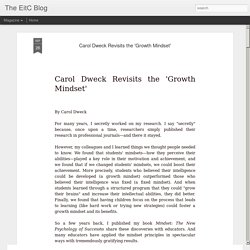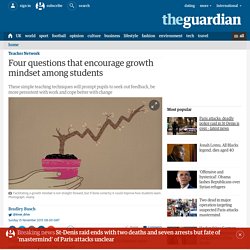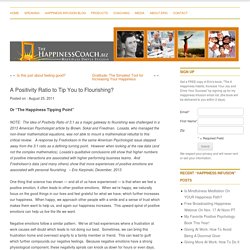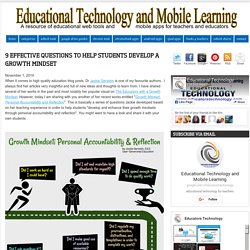

Mihaly Csikszentmihalyi on flow. Developing a Growth Mindset in Teachers and Staff. The New Psychology of Success (2000), Dweck developed a continuum upon which people can be placed, based upon their understandings about where ability comes from.
For some people (at one end of said continuum), success (and failure) is based on innate ability (or the lack of it). Deck describes this as a fixed theory of intelligence, and argues that this gives rise to a ‘fixed mindset’. At the other end of the continuum are those people who believe success is based on a growth mindset. These individuals argue that success is based on learning, persistence and hard work. According to Dweck: In a fixed mindset students believe their basic abilities, their intelligence, their talents, are just fixed traits. The crucial point for individuals is that these mindsets have a large impact upon our understanding of success and failure. Needless to say, this idea of mindsets has significant implications for education.
Crucially, Dweck’s research is applicable to all people, not just students. EdintheClouds: Carol Dweck Revisits the 'Growth Mindset' By Carol Dweck For many years, I secretly worked on my research.

I say "secretly" because, once upon a time, researchers simply published their research in professional journals—and there it stayed. However, my colleagues and I learned things we thought people needed to know. We found that students' mindsets—how they perceive their abilities—played a key role in their motivation and achievement, and we found that if we changed students' mindsets, we could boost their achievement.
More precisely, students who believed their intelligence could be developed (a growth mindset) outperformed those who believed their intelligence was fixed (a fixed mindset). So a few years back, I published my book Mindset: The New Psychology of Successto share these discoveries with educators. —Jori Bolton for Education Week This is wonderful, and the good word continues to spread. A growth mindset isn't just about effort. Recently, someone asked what keeps me up at night. Four questions that encourage growth mindset among students. Teachers have long battled with how to get their students to become more resilient and improve their mindset.

One popular theory, pioneered by Carol Dweck, professor of psychology at Stanford University, is the idea of growth mindset. Dweck explains that some students believe ability is malleable and can be improved (a growth mindset), while others think it is set in stone, probably decided at birth (a fixed mindset). Evidence suggests that those with a growth mindset seek out feedback on how to get better, persist with work for longer and cope better with change – all attitudes teachers want to develop in their young charges. A Positivity Ratio to Tip You to Flourishing? Or “The Happiness Tipping Point” NOTE: The idea of Positivity Ratio of 3:1 as a magic gateway to flourishing was challenged in a 2013 American Psychologist article by Brown, Sokal and Friedman.

Losada, who managed the non-linear mathematical equations, was not able to mount a mathematical rebuttal to this critical review. A response by Fredrickson in the same American Psychologist issue stepped away from the 3:1 ratio as a defining turning point. However when looking at the raw data (and not the complex mathematics), Losada’s qualitative conclusions still show that higher numbers of positive interactions are associated with higher performing business teams. And Fredrickson’s data (and many others) show that more experiences of positive emotions are associated with personal flourishing. – Eric Karpinski, December, 2013 One thing that science has shown — and all of us have experienced — is that when we feel a positive emotion, it often leads to other positive emotions. Eric Karpinski. Positive psychology.
Resources for Educators. Strengths & Resources. Character Experts, Character Strengths: VIA Character. Mindset Quotes by Carol S. Dweck. 9 Effective Questions to Help Students Develop A Growth Mindset. November 1, 2014 When it comes to high quality education blog posts.

Dr Jackie Gerstein is one of my favourite authors. I always find her articles very insightful and full of new ideas and thoughts to learn from. I have shared several of her works in the past and most notably her popular visual on The Educators with a Growth Mindset. However, today I am sharing with you another of her recent works entitled "Growth Mindset: Personal Accountability and Reflection".
Carol Dweck 'Mindset - the new psychology of success' at Happiness & Its Causes 2013. Fixed vs. Growth Mindsets. Positive Psychology.